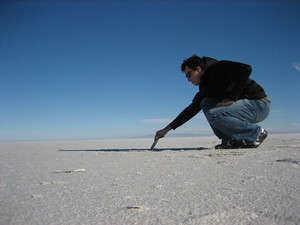This is a paper that I wrote today for an Asignature, I found it soo important that I wanted it to remain forever.
1.A project manager should visit everyone who is building anything for his project at least once, should know all the managers on his project (both government and contractor), and know the integration team members. People like to know that the project manager is interested in their work and the best proof is for the manager to visit them and see first hand what they are doing.
2.Don't get too egotistical so that you can't change your position, especially if your personnel tell you that you are wrong. You should cultivate an attitude on the project where your personnel know they can tell you of wrong decisions.
3.A manager who is his own systems engineer or financial manager is one who will probably try to do open heart surgery on himself.
4.The seeds of problems are laid down early. Initial planning is the most vital part of a project. The review of most failed projects or project problems indicate the disasters were well planned to happen from the start.
5.Cooperative efforts require good communications and early warning systems. A project manager should try to keep his partners aware of what is going on and should be the one who tells them first of any rumor or actual changes in plan. The partners should be consulted before things are put in final form, even if they only have a small piece of the action. A project manager who blindsides his partners will be treated in kind and will be considered a person of no integrity.
6.You cannot watch everything. What you can watch is the people. They have to know you will not accept a poor job.
7.If you have someone who doesn't look, ask, and analyze; ask them to transfer.
8.People who monitor work and don't help get it done never seem to know exactly what is going on (being involved is the key to excellence).
9.There is no greater motivation than giving a good person his piece of the puzzle to control, but a pat on the back or an award helps.
10.Hide nothing from the reviewers. Their reputation and yours is on the line. Expose all the warts and pimples. Don't offer excuses—just state facts.
11.Documentation does not take the place of knowledge. There is a great difference in what is supposed to be, what is thought to have happened, and reality. Documents are normally a static picture in time that get outdated rapidly.
12.Being friendly with a contractor is fine—being a friend of a contractor is dangerous to your objectivity.
13.There is only one solution to a weak project manager in industry—get rid of him fast. The main job of a project manager in industry is to keep the customer happy. Make sure the one working with you knows that it is not flattery but on-schedule, on-cost, and a good product that makes you happy.
14.Remember the boss has the right to make decisions. Even if you think they are wrong, tell the boss what you think but if he still wants it done his way; do it his way and do your best to make sure the outcome is successful.
15.Never ask management to make a decision that you can make. Assume you have the authority to make decisions unless you know there is a document that states unequivocally that you can't.
16.Most of yesteryear's projects overran because of poor estimates and not because of mistakes. Getting better estimates will not lower costs but will improve NASA's business reputation. Actually, there is a high probability that getting better estimates will increase costs and assure a higher profit to industry unless the fee is reduced to reflect lower risk on the part of industry. A better reputation is necessary in the present environment.
17.All problems are solvable in time, so make sure you have enough schedule contingency—if you don't, the next project manager that takes your place will.
18.Wrong decisions made early can be recovered from. Right decisions made late cannot correct them.
19.Never assume someone knows something or has done something unless you have asked them; even the obvious is overlooked or ignored on occasion, especially in a high stress activity.
20.Never make excuses; instead, present plans of actions to be taken.
All of these ideas were extracted from the following link:
http://www.altisinc.com/Links/100_Rules.html#ProjectMgr
Sunday, February 12, 2006
Subscribe to:
Post Comments (Atom)





No comments:
Post a Comment